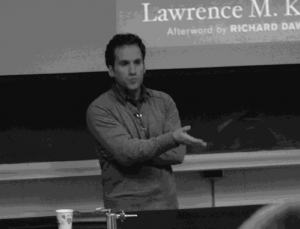
Photo by Jessica Prokop
There have been many theories about the cosmos throughout the centuries, some of which most famously crafted by philosophers, such as Plato and Aristotle. Even so, more modern theories were already being explored long before their time.
This concept is what students, faculty and community members gathered to ponder during the first Science Colloquium of the semester, “The Origins of Cosmology in Ancient Greece,” on Feb. 21 in Murdoch 105.
Jason Jordan, visiting assistant professor of philosophy, led the discussion for the packed lecture hall. The group was one of the biggest turnouts to the series so far, said Jennifer Heath, chair and associate professor of physics.
During the lecture, Jordan discussed how more modern theories of the time actually date back to the sixth century B.C. from a school on the West coast of Asia Minor. Philosophers from the area, Anaximander and Democritus, were already pondering theories, such as gravity, atomic theory and the universe.
Although no written works remain, Anaximander is believed by many to be the first true philosopher and scientist, Jordan said.
The Greek philosopher is most noted for his work in describing the origin and mechanics of Earth and its relevance to other celestial bodies, Jordan said.
Anaximander spent a lot of time exploring what supports the Earth. He determined that indifference holds the Earth in place, a logical force, Jordan explained.
About a century and a half after Anaximander, Democritus tried other ways of viewing the universe. He compared the universe to a cosmic whirl, arguing that Earth is like the collected garbage of the vortex. He also argued that there were infinite numbers of worlds. Democritus believed the friction caused by the swirling accounted for the heat and glow of the Sun and stars, Jordan said.
Jordan rounded out his lecture with Democritus’ argument that the world has no cause. Other philosophers of the time disagreed with this notion, saying that nothing can exist without cause. Democritus answered the metaphysical question of why is there something rather than noting by saying there is no reason why.
“I think it’s interesting reading about and listening to people from long ago. To read and understand their reasons is strange. I like it,” Jordan said.
The next Science Colloquium will focus on the Big Bang Theory, presented by Michael Crosser, assistant professor of physics, Feb. 28.
Jessica Prokop/Editor-in-Chief
Jessica can be reached at [email protected]






